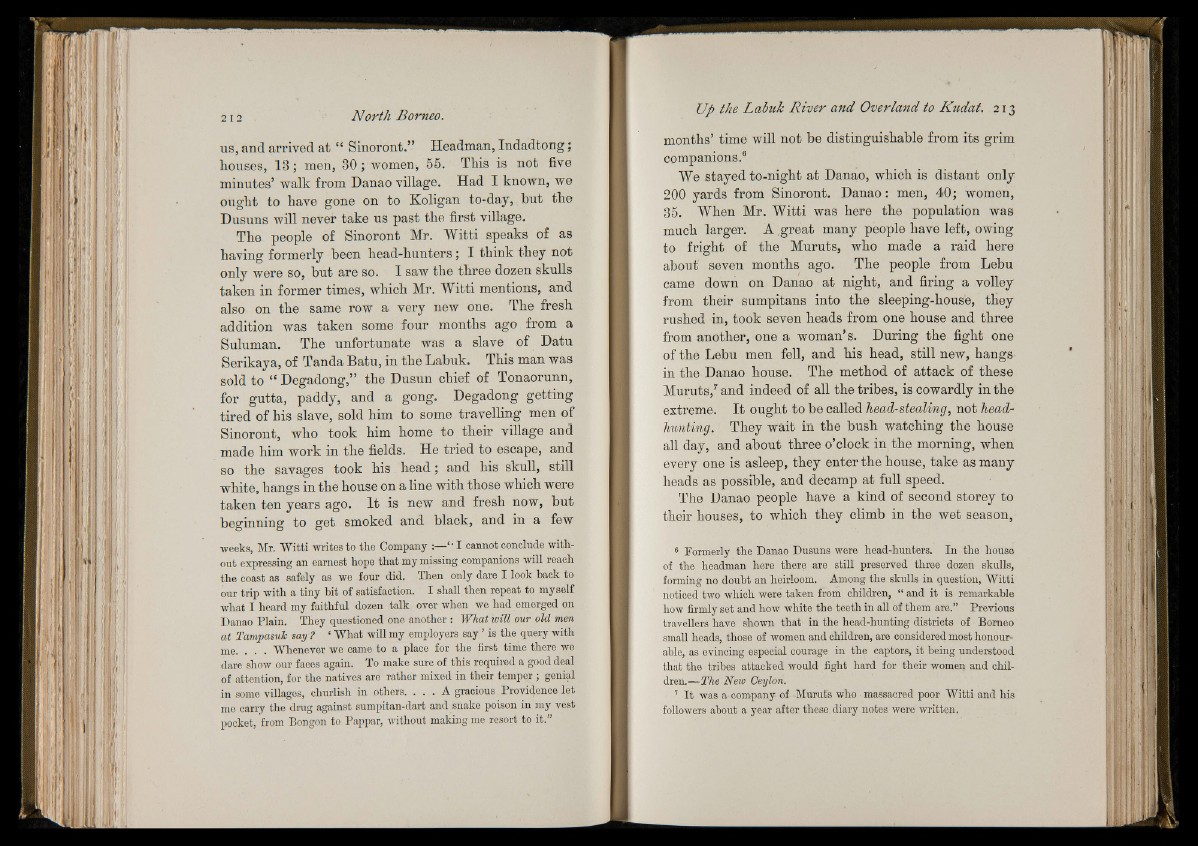
us, and arrived at “ Sinoront.” Headman, Indadtong;
houses, 13; men, 30; women* 55. This is not five
minutes’ walk from Danao village. Had I known, we
ought to have gone on to Koligan to* day, hut the
Dusuns will never take us past the first village.
The people of Sinoront Mr. Witti speaks of as
having formerly been head-hunters; I think they not
only were so, but are so. I saw the three dozen skulls
taken in former times, which Mr. Witti mentions, and
also on the same row a very new one. The fresh
addition was taken some four months ago from a
Suluman. The unfortunate was a slave of Datu
Serikaya, of Tanda Batu, in the Labuk. This man was
sold to “ Degadong,” the Dusun chief of Tonaorunn,
for gutta, paddy, and a gong. Degadong getting
tired of his slave, sold him to some travelling men of
Sinoront, who took him home to their village and
made him work in the fields. He tried to escape, and
so the savages took his head; and his skull, still
white, hangs in the house on a line with those which were
taken ten years ago. I t is new and fresh now, but
beginning to get smoked and black, and in a few
weeks, Mr. Witti writes to the Company I cannot conclude without
expressing an earnest hope that my missing companions will reach
the coast as safely as we four did. Then only dare I look back to
our trip with a tiny hit of satisfaction. I shall then repeat to myself
what I heard my faithful dozen talk over when we had emerged on
Danao Plain. They questioned one another : What will our old men
at Tampasuk say ? ‘ What will my employers say ’ is the query with
me. . . . Whenever we came to a place for the first time there we
dare show our faces again. To make sure of this required a good deal
of attention, for the natives are rather mixed in their temper; genial
in some villages, churlish in others. . . . A gracious Provi4ence let
me carry the drug against sumpitan-dart and snake poison in my vest
pocket, from Bongon to Pappar, without making me resort to it.”
mouths’ time will not be distinguishable from its grim
companions.6
We stayed to-night at Danao, which is distant only
200 yards from Sinoront. Danao: men, 40; women,
35. When Mr. Witti was here the population was
much larger. A .great many people have left, owing
to fright of the Muruts, who made a raid here
about seven months ago. The people from Lebu
came down on Danao at night, and firing a volley
from their sumpitans into the sleeping-hous'e, they
rushed in, took seven heads from one house and three
from another, one a woman’s. During the fight one
of the Lebu men fell, and his head, still new, hangs-
in the Danao house. The method of attack of these
Muruts,7 and indeed of all the tribes, is cowardly in the
extreme. I t ought to be called head-stealing, not headhunting.
They wait in the bush watching the house
all day, and about three o’clock in the morning, when
every one is asleep, they enter the house, take as many
heads as possible, and decamp at full speed.
The Danao people have a kind of second storey to
their houses, to which they climb in the wet season,
6 Formerly the Danao Dusuns were head-hunters. In the house
of the headman here there are still preserved three dozen skulls,
forming no doubt an heirloom. Among the skulls in question, Witti
noticed two which were taken from children, “ and it is remarkable
how firmly set and how white the teeth in all of them are." Previous
travellers have shown that in the head-hunting districts of Borneo
small heads, those of women and children, are considered most honourable,
as evincing especial courage in the captors, it being understood
that the tribes attacked would fight hard for their women and children.—
The New Ceylori.
7 It was a- company of 'Muruts who massacred poor Witti and his
followers about a year after these, diary notes were written.